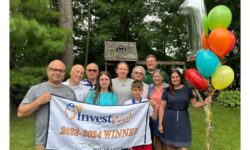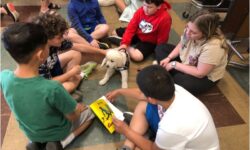[ccfic caption-text format="plaintext"]
Give children a computer and the world is at their fingertips, but with that access comes a host of potential pitfalls. How do they learn to manage their time? How do they identify fact from fiction when searching Google for information? When Westwood Public Schools gave each of its high school students a computer five years ago, the district also gave them something invaluable: a seminar called Digital Citizenship.
“We learned very quickly that we needed to provide some additional support for kids to help manage better use of the device,” said Steve Ouellette, director of technology, learning and innovation for Westwood Public Schools. The first Digital Citizenship Seminar was held in 2014 and immediately became a required course for all high school freshmen.
“It teaches them how to be good digital citizens. It covers things like being appropriate when online, managing distractibility, using their devices to their greatest potential as well as how to find and vet information they find on the web,” said Ouellette.
The ten-session course is taught by three instructional technology coaches and has undergone some changes recently to ensure the course provides skill building in real life “performance tasks,” which students are required to complete.
“Up until now, it’s been more of the teacher talking to the students about what they should do,” Ouellette explained. “But now they’ll be required to do things like email a teacher using proper format. The majority of these tasks will not be additional work, but rather something they document. The whole point is that kids have to do these things anyway. The focus is kids doing something tangible. It adds so much more meaning to what we’re trying to get across.”
Students are also required to assemble their own “digital hub” as part of the seminar. Since different teachers use different platforms and technologies in their classrooms, the digital hub is a landing page where students compile all their links and courses so that students can get to any work in any class with two clicks or less.
“The Digital Citizenship Seminar fits perfectly into our diverse curriculum,” said Westwood Public Schools Superintendent Emily Parks. “As important as it is that students are savvy when it comes to technology, we take the responsibility and citizenship aspects very seriously. These are skills that will stay with them long after they graduate.”
Other highlights include a requirement which asks students to showcase one of their passions outside of the classroom – for example, one student promoted his blossoming photography business and another created a social media page focusing on local sports. In order to complete the seminar, students are also required to pass the CRAAP test. CRAAP is an acronym for currency, relevance, authority, accuracy and purpose. The test is designed to help determine if sources are trustworthy and appropriate for academic research.
Ouellette says students truly seem to appreciate what they’ve learned. “I talk to students who are juniors and seniors about how they’re handling their use of technology. They tell me they developed systems on how to stay focused and how they learned to think twice before posting online. I think the course has evolved to a point where they really grasp and continue to use what they’re learning.”
























